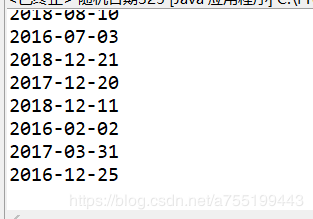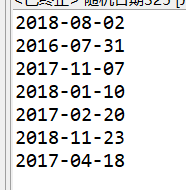Or because filling in self-built data tables requires a range of random dates, with the goal of being elegant, concise and efficient.
There are two ideas:
- Generate a required 13-bit random number as milliseconds and convert milliseconds into Date classes in java.sql packages
- A random year is generated, and then a random day is generated according to the range of days determined by the year and month.
First code, then efficiency comparison.
The designated scope is 2016-2018 (i.e. 1 January 2016-31 December 2018).
Method of generating thirteen random numbers:
public static Date randomHireday() { int startYear=2016; //Starting year of specified random date int endYear=2018; //Starting year of specified random date (including) long start = Timestamp.valueOf(startYear+1+"-1-1 0:0:0").getTime(); long end = Timestamp.valueOf(endYear+"-1-1 0:0:0").getTime(); long ms=(long) ((end-start)*Math.random()+start); //The qualified number of 13-bit milliseconds is obtained. Date hireday=new Date(ms); return hireday; }
Ten cycles:
Random years and days are generated respectively:
public static Date randomHireday2() { int startYear=2016; int endYear=2018; int year = (int)(Math.random()*(endYear-startYear+1))+startYear; //Random year int month= (int)(Math.random()*12)+1; //Random Month Calendar c = Calendar.getInstance(); //Create Calendar objects c.set(year, month, 0); //Setting Date int dayOfMonth = c.get(Calendar.DAY_OF_MONTH); //How many days to get the corresponding year and month int day=(int)(Math.random()*dayOfMonth+1) ; //Generating random days Date hireday=Date.valueOf(year+"-"+month+"-"+day); //Generating Date Object by valueOf Method return hireday; }
Ten cycles:
Now start testing efficiency, 10 short tests and 100,000 long tests, respectively.
public static void main(String[] args) { //Random thirteen digits long start; long end; start = System.currentTimeMillis(); for(int i=0;i<10;i++) { randomHireday(); } end = System.currentTimeMillis(); System.out.println("Time spent in 10 cycles of random 13 digits:"+(end-start)); start = System.currentTimeMillis(); for(int i=0;i<100000;i++) { randomHireday(); } end = System.currentTimeMillis(); System.out.println("Time spent in 100,000 random 13-digit cycles:"+(end-start)); //Random generation year, month and day start = System.currentTimeMillis(); for(int i=0;i<10;i++) { randomHireday2(); } end = System.currentTimeMillis(); System.out.println("Time spent in 10 cycles of each random generation year, month and day:"+(end-start)); start = System.currentTimeMillis(); for(int i=0;i<100000;i++) { randomHireday2(); } end = System.currentTimeMillis(); System.out.println("Time spent in 100,000 cycles of random generation year, month and day:"+(end-start)); }

Obviously, the more concise and elegant method of thirteen random numbers is more efficient.
Thus, we can get an elegant, concise and efficient random date generation method.